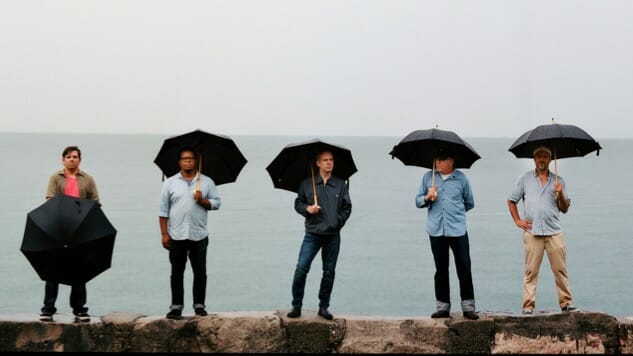Tortoise’s Doug McCombs on The Catastrophist

Since the turn of the millennium, the wait between albums by the long-serving experimental ensemble Tortoise has gotten longer and longer. By the time the group’s seventh full-length The Catastrophist finally dropped into stores and online retailers last week, it had been just under seven years since the last LP. The long breaks are, by and large, forgivable as each of the five members of the group—John McEntire, Jeff Parker, Doug McCombs, Dan Bitney and John Herndon—are plenty busy with other creative endeavors. And good music, particularly when it is as complex and thoughtful as Tortoise’s, often needs a long time to gestate.
That’s certainly true of The Catastrophist. Even with their use of some material commissioned by the City of Chicago to help celebrate that town’s musical history, the songs on this LP were meticulously worried over during their sporadic recording sessions at McEntire’s Soma Studios (Parker and Herndon now live in Los Angeles, adding an extra hurdle to their process).
The album is all the better for their efforts, too, as it furthers the evolution of this ensemble, with them finding inventive ways to adapt their signature synth and bass tones into frameworks built from African highlife, Steve Reich, post-punk and modern hip-hop productions. The album also brings vocals into the mix for the first time since their 2006 covers album recorded with Bonnie ‘Prince’ Billy, with former U.S. Maple singer Todd Rittmann joining them on a cover of the David Essex hit “Rock On,” and an original song co-written with Yo La Tengo’s Georgia Hubley.
To learn even more about the process of creating The Catastrophist and Tortoise’s working methods, we grabbed a few minutes on the phone with multi-instrumentalist and founding member Doug McCombs.
Paste: Since a chunk of the material on The Catastrophist was initially written for a commission you received from the City of Chicago, how challenging was it to adapt those into the songs that are on the new album?
Doug McCombs: It wasn’t abnormally difficult. It was good to have some things to start with at least. Working on Tortoise music can be a tedious process because we usually start with bare-bones ideas and make them into songs in the studio. In this instance, we already had the beginnings of things so that made it a little easier. But we definitely had to rethink how to approach this material because originally the stuff we wrote for that City of Chicago thing…they weren’t uncomposed…it was more about trying to find room for extra musicians to play on them. In some cases they were just a framework of a song to allow the improvisers to have some room to play solos. In some instances, with the extra musicians we used them as part of the arrangements of the songs, but we had some pretty open sections for solos. To make them into stuff that we wanted to put out on a record we had to add more parts and change the arrangements and reharmonize some of the stuff. So, it took a little work.
Paste: Is that typical of how a Tortoise song is written, with some of the band coming in with the germ of an idea, or does it have to be all five of you in the same room creating things out of jam sessions?
McCombs: It happens in a variety of ways, but the most common is for it to be a really small kernel of an idea. And it could even be as minor as a rhythm pattern that someone thinks is interesting or maybe a melody without a chord structure around it. As a group, we work out what we think is an interesting way to present that. Over the course of time it builds up into something that we would call a song. On a few occasions there have been songs that have brought in as fully composed things that we’ve turned into songs. In any case, it all comes down to everyone’s input. That’s the interesting thing about the band: it’s five people’s viewpoint. We sort of end up with something that’s much more interesting than just one person’s input. Not every single member of the band has to be there all the time. We work on stuff in spurts. We were working on this stuff over the course of the last three years or so. Sometimes you don’t make any headway on a song and come back to it a year later and then somebody will have an idea of what direction it could take. Or two people have different ideas and we try to evaluate those things and try to incorporate them all into the finished track. Some songs go through multiple stages, and creative bursts and realizing that we don’t like the way it turned and we have to strip it down and do something else. Or abandon it completely. It’s a long process. In the end, it ends up being the most fruitful way for us to work because what ends up being a Tortoise song is ultimately much more interesting than just one person’s input.
-

-

-

-

-

-

-

-

-

-

-

-

-

-

-

-

-

-

-

-

-

-

-

-

-

-

-

-

-

-

-

-

-

-

-

-

-

-

-

-








































